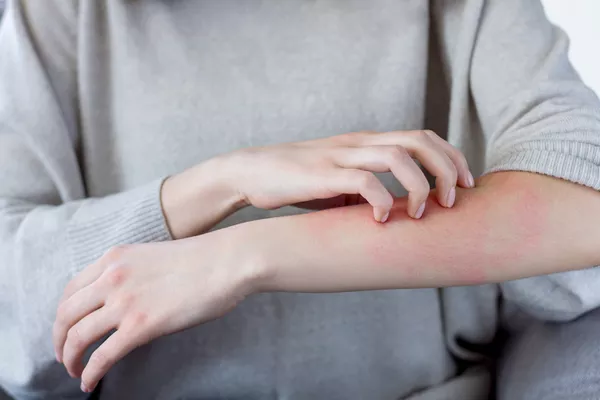Hives, clinically known as urticaria, are characterized by the sudden appearance of raised, itchy welts on the skin. When these hives occur predominantly at night, it can be particularly distressing due to the disruption of sleep and the exacerbation of symptoms during the nighttime hours. Understanding the underlying causes of nocturnal hives is essential for effective management and relief.
What Are Hives?
Hives are a common skin reaction that affects about 20% of people at some point in their lives. They can appear suddenly and often disappear just as quickly. The welts can vary in size and shape and may merge together to form larger areas of swelling. Hives are typically caused by the release of histamine and other chemicals into the skin, leading to the characteristic redness, swelling, and itching.
Causes of Nighttime Hives
Hives that primarily occur at night can have several underlying causes. Identifying these triggers is crucial for managing the condition effectively.
1. Evening Allergen Exposure
One possible reason for nighttime hives is exposure to allergens during the evening hours. This could include certain foods consumed at dinner that trigger an allergic reaction or allergens present in the bedroom environment, such as dust mites in bedding or pet dander.
2. Temperature and Environmental Factors
Nighttime temperature changes, such as overheating under blankets or exposure to cold air, can provoke hives in susceptible individuals. Additionally, certain environmental factors in the bedroom, such as dust, pollen, or mold, can trigger allergic reactions leading to hives.
3. Stress and Hormonal Changes
Evening hours can be a time of increased stress or hormonal fluctuations, which might contribute to hives onset. Stress can exacerbate hives symptoms due to its impact on the immune system.
4. Medication Timing
The timing of medication intake can also play a role in nighttime hives. Some medications, when taken in the evening, may cause hives as a side effect, particularly if they are known to trigger allergic reactions.
5. Nocturnal Itching
Nighttime hives can lead to intense itching, which further irritates the skin and disrupts sleep. This cycle of itching and scratching can exacerbate the condition and make symptoms worse.
Investigating and Managing Nighttime Hives
Managing nighttime hives involves a systematic approach to identify triggers and implement appropriate treatment strategies.
1. Keep a Symptom Diary
Keeping a detailed diary of hives episodes can help identify patterns and potential triggers. Note down what you eat, activities, stress levels, and environmental factors leading up to bedtime.
2. Identify Allergens
Consulting an allergist for comprehensive allergy testing can help pinpoint specific allergens that may be triggering hives. This may include food allergy testing, skin prick tests, or blood tests.
3. Evaluate Bedroom Environment
Ensuring a clean and allergen-free bedroom environment is essential for individuals with nighttime hives. Use hypoallergenic bedding, wash bedding regularly in hot water to kill dust mites, and consider using an air purifier to reduce airborne allergens.
4. Manage Stress
Incorporating stress-reducing activities into your evening routine can help manage nighttime hives. Activities such as meditation, yoga, or deep breathing exercises can help calm the mind and body before bedtime.
5. Review Medications
If you suspect that medications are causing nighttime hives, discuss this with your healthcare provider. They may adjust your medication dosage or recommend alternative medications that are less likely to cause allergic reactions.
6. Seek Medical Evaluation
If nighttime hives persist or are severe, seek medical evaluation from a dermatologist or allergist. They can assess your symptoms, perform further diagnostic tests if necessary, and recommend appropriate treatment options.
Complications of Nighttime Hives
While most cases of hives are benign and resolve on their own, persistent or severe hives can have a significant impact on quality of life. Complications of nighttime hives may include:
- Sleep Disturbance: Intense itching and discomfort can disrupt sleep patterns, leading to fatigue and daytime drowsiness.
- Impaired Quality of Life: Chronic hives can affect emotional well-being and social activities due to the unpredictability of symptoms.
- Anaphylaxis: In rare cases, hives may be accompanied by more severe allergic reactions, including anaphylaxis, which is a life-threatening emergency requiring immediate medical attention.
Conclusion
Nighttime hives can be a challenging and disruptive condition that requires careful management and identification of triggers. By adopting a systematic approach to investigating potential causes and implementing appropriate treatment strategies, individuals with nighttime hives can often find relief and improve their quality of life. Working closely with healthcare professionals, including allergists and dermatologists, is essential to develop a personalized treatment plan that addresses specific triggers and symptoms. With proper management and diligence, nighttime hives can be effectively controlled, allowing for restful nights and improved overall well-being.
Related Topics:
Unraveling the Causes of Exercise-Induced Urticaria

























